Taxi Driver Blu-ray Movie
HomeTaxi Driver Blu-ray Movie 
Sony Pictures | 1976 | 114 min | Rated R | Apr 05, 2011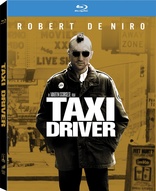
Movie rating
8.8 | / 10 |
Blu-ray rating
| Users | 4.6 | |
| Reviewer | 5.0 | |
| Overall | 4.8 |
Overview
Taxi Driver (1976)
A mentally unstable veteran works as a nighttime taxi driver in New York City, where the perceived decadence and sleaze fuels his urge for violent action.
Starring: Robert De Niro, Jodie Foster, Albert Brooks, Harvey Keitel, Leonard Harris (II)Director: Martin Scorsese
| Drama | Uncertain |
| Crime | Uncertain |
| Psychological thriller | Uncertain |
| Thriller | Uncertain |
Specifications
Video
Video codec: MPEG-4 AVC
Video resolution: 1080p
Aspect ratio: 1.85:1
Original aspect ratio: 1.85:1
Audio
English: DTS-HD Master Audio 5.1 (48kHz, 16-bit)
French: DTS-HD Master Audio 5.1 (48kHz, 16-bit)
Portuguese: DTS-HD Master Audio 5.1 (48 kHz, 16-bit)
Spanish: Dolby Digital 5.1
Subtitles
English, English SDH, French, Portuguese, Spanish, Korean, Mandarin (Traditional), Thai
Discs
50GB Blu-ray Disc
Single disc (1 BD)
Bonus View (PiP)
BD-Live
movieIQ
Playback
Region free
Review
Rating summary
| Movie | 5.0 | |
| Video | 5.0 | |
| Audio | 5.0 | |
| Extras | 5.0 | |
| Overall | 5.0 |
Taxi Driver Blu-ray Movie Review
Sony delivers a Blu-ray worthy of being labeled a "masterpiece."
Reviewed by Martin Liebman March 22, 2011Then suddenly, there is a change.
Taxi Driver is one of the most ambiguous pictures of them all, and the ambiguity begins with the title. Who is a "taxi driver?" A "taxi
driver," or at least the title implies and the profession dictates, is a person who knows how to get somewhere, is capable of delivering others to a
destination of their choosing,
but who himself never actually goes anywhere. His is a journey of circles, of a continuous string of coming and going, but never really arriving
anywhere. He never finds a place to settle or stop; the destination is but another leg of the endless circle of seeing others to their homes or places
of business or recreation, but for the cab driver the symbolism of only delivering rather than arriving is impossible to miss. "Taxi driver" is also highly
impersonal; it denotes not only a profession but an invisible, forgettable figure, one that plays an important role but who vanishes without a
thought, for some as soon as the cab ride ends, for others he remains an empty vessel behind a wheel even during the ride. Now, imagine a "taxi
driver" who takes this existence outside of the cab and into every facet of his life. He sees a world around him that's always on the march, always
headed somewhere, and whether he likes the direction or destination or not is irrelevant. It's not his choice; he's only along for the ride, going
where others tell him, powerless to stop it -- unless he chooses to break the rules of the game. Taxi Driver is a masterpiece motion picture
that focuses like a laser on a life and a world both out of focus; it's a picture where nothing works as it should, at least in the mind of the "taxi
driver." He's in search of a place in the world, a role to play, but he comes to understand that his life, like his profession, is an unending circle of
nothingness that passes him by without so much as a blink of an eye. He sees opportunities to better himself and the world around him, both of
which lead to dire, unwanted consequences. Is the world what a man makes of it, or does the world make a man?
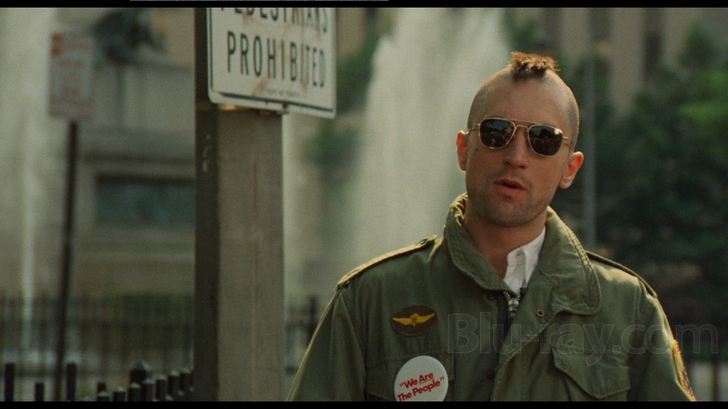
Travis Bickle, taxi driver.
Travis Bickle (Robert De Niro, Ronin) is a 26 year-old former Marine, an honorably discharged Vietnam veteran. He's a chronic insomniac who lands a job driving a cab around New York City at all hours of the night, soul searching as he drives, looking for his place in a world he sees in dire need of cleansing, meaning a clearing out of various individuals, attitudes, and ways of life he deems undesirable. Still, Travis seems like a gentle enough man, troubled yes but only wanting something better for his life. He one day catches a glimpse of a woman in white, giving her the appearance of an angel. She's Betsy (Cybill Shepherd), a campaign worker dedicated to the election of Presidential candidate Charles Palantine (Leonard Harris). Bickle finds the courage to ask her out through the guise of volunteering his time at the campaign office. The relationship goes well, but when Bickle's choice of date activities pushes Betsy away, he experiences a sudden change, becoming more hostile and developing a grudge against Palantine. Meanwhile, he meets a young prostitute of 12 years of age, Iris (Jodie Foster, The Silence of the Lambs), whom he develops almost paternal feelings for and seeks to free her from her go-nowhere lifestyle and the figurative chains of her pimp, "Sport" (Harvey Keitel, Reservoir Dogs).
For such an iconic picture -- and Taxi Driver is one of the few truly great films of them all and perhaps the definitive picture of the gritty big city films of the 1970s -- there are precious few certainties to be found in it. Taxi Driver is a picture open to multiple interpretations with no right or wrong answer; the absence of a definitive purpose, theme, or emotion is, in fact, the film's greatest strength. Director Martin Scorsese (Shutter Island) has built a picture centered not around a plot but a mind, a mind that sees the urban landscape of 1970s New York City from the perspective of a wayward former Marine who slowly unravels as the world around him spins him loose like a ball of yarn -- or is it he who through his own actions unspools the world? One possible theme of Taxi Driver centers on man's place in the world; does the world reject him, or does he reject the world? Does one influence or bring about the other? What is the trigger? Is it a series of events or a singularity? Taxi Driver is a therapist's dream film. The picture is but a snapshot of a larger whole that the audience never knows; much may be deduced from what's here, but not to any degree of satisfactory assurance of what makes Travis Bickle the man he becomes by film's end. His is a transformation from an obviously troubled but seemingly amicable individual only in search of himself and his role in the world to an individual unafraid to dole out justice based on his own evolving values and world view. Of course, whether Travis sees the bigger picture -- for his life, the lives of those around him, and that of the greater whole -- is another of the film's mysteries, but one of the few certainties of Taxi Driver is that it is an intoxicating and infinitely re-watchable slice of psychological cinema the likes of which has not since been duplicated and that offers new emotional and mind-churning undercurrents with every viewing.
Martin Scorsese reinforces the film's thematic ambiguity and emotional unbalance with what amounts to a visual seesaw that gives the movie a unique contrast that offsets right and wrong, certain and uncertain, and normal and abnormal -- but does so in a way that does not necessarily champion, or even really define, any of the above. Travis's world finds trouble by day and solidarity by night, and vice versa; the city that never sleeps never settles for anything but absolute chaos, at least as it is seen through Travis's eyes. Neither day nor night -- the contrast between light and dark and taken to greater metaphorical levels, right and wrong -- offer reprieve from Travis's worldview; that he is an insomniac, unable to differentiate between light and dark or settle into the routine of the world, only reinforces the notion that in Taxi Driver the only thing that can be certain is the film's and its characters's uncertainties. It's that imbalance that gives the movie its character; even the opening title sequence is framed by Bernard Herrmann's score that plays harshly and without much in the way of structure and certainty, and gives way on a whim to light, breezy, and amicable Jazz-like notes that immediately transform the general feel from hard and distant to smooth and inviting. Such is the case throughout the entire picture. Of course, there's Travis's own transformation, from a troubled and topsy-turvy but likable soul into a beast of a man who picks up a gun, rebels against the norm by shaving his head to a mohawk, and sets out to do as he does in his cab, deliver people to and from their destinations, only here the destinations are chosen by Travis and the means of achieving the goal is accomplished with the pull of the trigger rather than the turning of the wheel. Taxi Driver is the textbook case film for competently unbalanced and deliberately wayward filmmaking; Martin Scorsese's masterpiece thrives on the absence of certainty, and maybe even Travis Bickle himself could not pinpoint exactly what it is that defined his life as it is portrayed in the film.
Of course, it takes a special kind of talent and a special kind of understanding of this sort of material to be able to not only give life to a character such as Travis Bickle, but do so in convincing fashion. Robert De Niro turns in what may be his absolute finest performance, managing to give an off-kilter character in a completely unbalanced film a positive grounding while displaying a firm understanding of what Scorsese and Writer Paul Schrader seem to be trying to accomplish with the film, which is to create a disembodied soul trying to exist in a world he sees as being irrevocably out-of-control. De Niro's turn as Travis Bickle is positively haunting; he manages to give shape to the character without ever really providing him a soul, to breathe life into a character that otherwise appears dead or soon-to-be-dead to the world he, in turn, views as being shapeless and on the brink of destruction. Even considering his iconic pedigree and instantly-recognizable looks, De Niro completely dissolves into the part; his narration becomes the voice of the film as much as his face becomes its icon. Every set, prop, and costume become the character as De Niro puts them into play; the seamlessness with which he both monologues and dialogues is impeccable, and again that contrast between the outer Bickle and the man that lives inside is given a harmonious imbalance that De Niro plays perfectly and that, with similar elements, helps to shape an otherwise deliberately shapeless picture. De Niro is flanked by a pair of leading ladies who receive second billing but do not deliver second-level performances; Cybill Shepherd and Jodie Foster are fantastic as two of the driving forces behind Bickle's actions and the primary objects of his attention. Foster's part, in particular, is as challenging both on paper and in the flesh as De Niro's; the then-young actress handles the difficult part of a child prostitute with an unflinching honesty and realism that may be her finest performance, too.
Taxi Driver Blu-ray Movie, Video Quality 
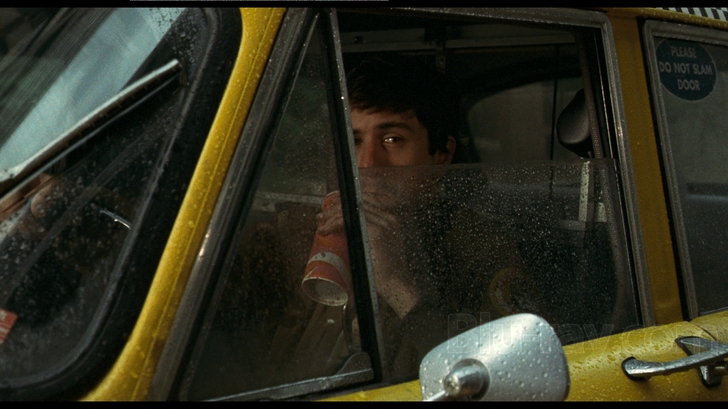
The Columbia Pictures logo looks kinda rough. Bummer. That's about all there is that's bad to say about Sony's breathtakingly gorgeous Blu-ray release of Taxi Driver. A recent recipient of a 4K restoration, Taxi Driver looks extraordinarily good, so good, in fact, that it's difficult to imagine the movie looking any better than this upon its initial theatrical release in 1976. That's the beauty of this restoration; the film looks as it's meant to look: it's occasionally a bit rough around the edges -- a few scenes appear soft, colors are slightly dulled, a bit of grain swirls around the image - - but the critical factor for this and most any Blu-ray release, really, is preserving the integrity of the image as it was and was meant to be seen. Sony's Blu-ray release does just that. As a general rule, clarity is astounding -- positively astounding -- and viewers both intimately familiar with Scorsese's film and Cinematographer Michael Chapman's handiwork or new to the picture will be awed at the way the image doesn't look like a new 2011 movie, but looks like a brand new 1976 release. The general film-like texture makes this a revelation, and the Blu-ray resolution, grain retention, and the like only add to the way the transfer so effortlessly brings out the finest available details, right down to ever-so-slight layers of dirt on Bickle's yellow taxi. Facial and clothing details are extraordinary, too, and shadow detail is top-notch; black levels are positively immaculate. As noted, colors aren't particularly vibrant, but they appear in such a way that they blend into the general context and broader look for which Scorsese's films strives. Still, the yellow cab, various shades of period clothing, and even the bluing on Bickle's .44 magnum revolver all look positively gorgeous within the context of the film's parameters. In short, this is a revelation, one of the finest transfers of a classic film ever to grace a Blu-ray disc. Sony continues to prove to be the cream of the crop when it comes to quality of Blu-ray transfers; Taxi Driver may be the studio's crowning achievement to date.
Taxi Driver Blu-ray Movie, Audio Quality 
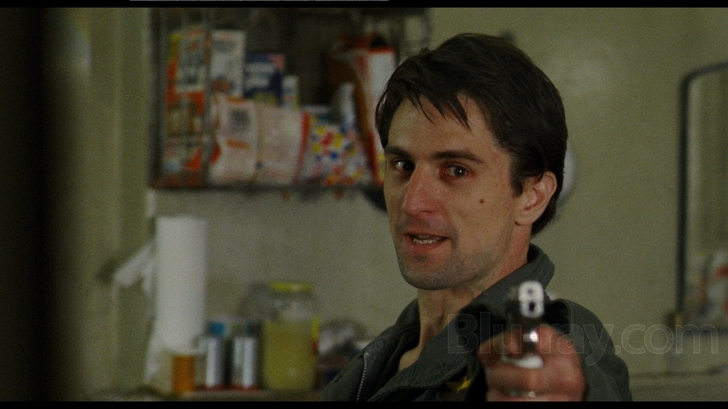
Taxi Driver's DTS-HD MA 5.1 lossless soundtrack is just as great as its 1080p video counterpart. While the precision of a brand-new track might be absent, Sony's 5.1 mix captures the very essence of Taxi Driver's varied soundtrack with ease. Besides, clarity and definition are top-shelf as they are; Bernard Herrmann's soundtrack has never enjoyed so much accuracy for home listening as it does here. Every Jazz-like note is smooth and every more mangled, heavy element is as it should be. Spacing is terrific; music plays primarily across the front, enjoying a robust presence and some surround sound support. Ambience is exceptional, too; whether the sounds of the city or the bustle of a campaign office, Taxi Driver delivers an accurate and noticeable but not overwhelming atmosphere that gives body and life to the overall presentation. Gunshots and a few heavier effects play as a bit crunchy and mushy, but better to leave such effects as they were meant to be head rather than give them a phony amped-up 2011 feel. Of course, dialogue is problem-free and center-focused. It probably won't get quite the attention that the video transfer will deservedly earn, but Sony's lossless soundtrack is no less impressive.
Taxi Driver Blu-ray Movie, Special Features and Extras 
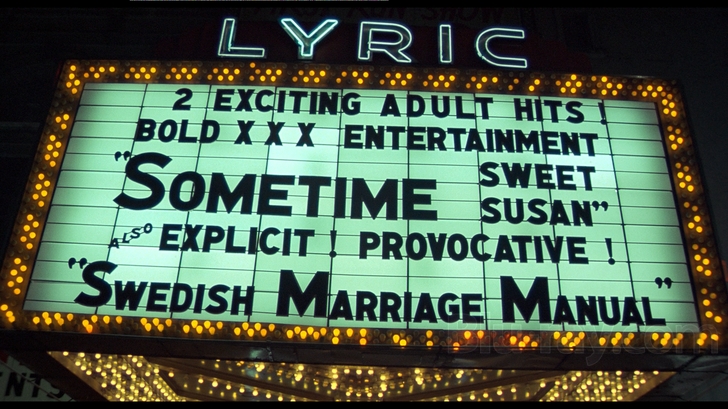
Sony has pulled out all the stops and released what amounts to a definitive Blu-ray edition of Taxi Driver. Housed in a sturdy and handsome
trifold cardboard case that contains a dozen color and black-and-white lobby card reprints, this special edition also boasts a myriad of on-disc extras,
including an
interactive script, three audio commentaries, a Martin Scorsese interview, several featurettes, a making-of documentary that runs over an hour in
length, storyboards, photo galleries, and more.
- Interactive Script to Screen: A unique feature that presents the script on-screen as the film plays. Users may choose to sync the script with the film or to peruse it independently of the movie.
- Original 1986 Audio Commentary: Originally recorded for the Criterion Collection LaserDisc release of Taxi Driver, this track features Director Martin Scorsese and Writer Paul Schrader. Scorsese discusses his filmmaking style, shooting in New York, set design, casting, and plenty of other insightful tidbits. Meanwhile, Schrader discusses the rapidity with which he wrote the script, the themes of the story, the genesis of metaphor through theme, refinements to the script along the way, and plenty more. The commentators were recorded separately and later edited together. A moderator of sorts identifies the speakers and provides various background tidbits of her own.
- Audio Commentary: University of Virginia Professor Robert Kolker delivers what is easily the best and certainly most unique commentary of the bunch. His insights are incredibly precise and thought-provoking as he dissects the picture from every conceivable angle; he points out nuances in the photography and colors, how every scene emphasizes the greater whole, and much more. This track is basically akin to attending a film class lecture; it is alone worth the price of admission.
- Audio Commentary: Writer Paul Schrader returns to man the third and final track, discussing candidly the fallacies in his original script, differences from the script and the final film, the superiority of an actor demonstrating a trait rather than describing it, the performances of the cast, and plenty more. There are a few lengthy stretches of silence; still, this is a quality track, but if time is a factor it's the one of the three to gloss over.
- Martin Scorsese on Taxi Driver (1080p, 16:52): The director discusses what it took to get the film onto the screen: the people who made it happen, the casting process, Writer Paul Schrader's vision, the filmmakers's passion for the project, his inspirations and shooting styles, the character of Travis Bickle, the film's noir roots and European influences, and more.
- Producing Taxi Driver (1080p, 9:53): Producer Michael Phillips speaks on his involvement in the project: his attraction to the script, the film's themes, its characters, the work of Director Martin Scorsese and Actor Robert De Niro, the friction between the filmmakers and the studio, and other fascinating insights. Writer Paul Schrader also shares a few thoughts throughout the piece.
- God's Lonely Man (1080p, 21:42): An in-depth look at Travis Bickle, set against the backdrop of Writer Paul Schrader discussing his personal background and his influences in and process of writing the script.
- Influence and Appreciation: A Martin Scorsese Tribute (1080p, 18:30): Oliver Stone, Paul Schrader, Roger Corman, Robert De Niro, Robert Kolker, and others speak on the work and style of Director Martin Scorsese while also exploring the man behind the films.
- Taxi Driver Stories (1080p, 22:23): Former cab drivers discuss working in New York City in the 1970s.
- Making Taxi Driver (480p, 1:10:55): A comprehensive documentary that covers the entire filmmaking process, looking at the qualities and themes of the film, the work of the cast and crew, the film's legacy, and plenty more. Much of the information overlaps from previous commentaries and supplements, but viewers looking for a piece that's thorough but a bit more concise than the entire supplemental package will find much value here.
- Travis' New York (1080p, 6:16): Taxi Driver Cinematographer Michael Chapman and former New York Mayor Ed Koch discuss the New York of the 1970s.
- Travis' New York Locations (1080p, 4:49): A fascinating split-screen feature that shows nine clips from the 1975 film alongside the same New York locations as they were in 2006.
- Intro to Storyboards by Martin Scorsese (1080p, 4:32): The director speaks on the importance of storyboarding to his success.
- Storyboard to Film Comparison (1080p, 8:21): Various scenes played alongside their hand-drawn storyboard counterparts.
- Galleries (1080p, 9:28): Bernard Herrmann Score, On Location, Publicity Materials, and Scorsese at Work.
- Taxi Driver Theatrical Trailer (480p, 2:09).
- BD-Live.
- MovieIQ.
Taxi Driver Blu-ray Movie, Overall Score and Recommendation 
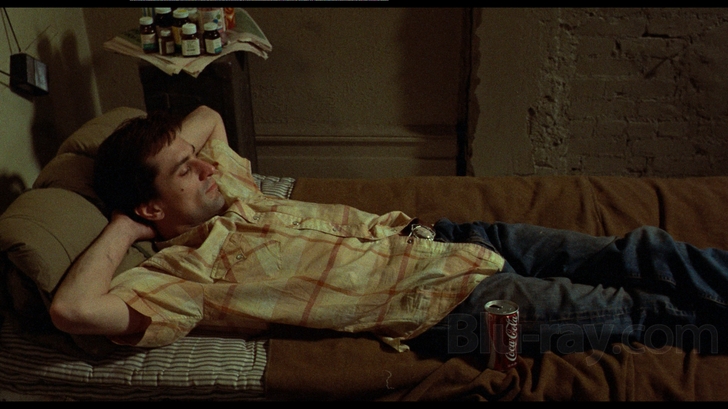
Taxi Driver is an iconic picture that thrives on imbalance, uncertainty, and all sorts of off-kilter elements. A challenging world, uncertain characters, and a general ambiguity that blurs several lines all make Taxi Driver a memorable masterpiece of mood and vagueness. Martin Scorsese's visuals back up the picture's feel, and Robert De Niro delivers the performance of a lifetime by giving shape to a shapeless character without sacrificing the mystery of just who Travis Bickle is and what it is that drives him to act as he does throughout the film. Taxi Driver is one of the all-time great pictures, and Sony has delivered an incredible Blu-ray package that's easily one the best overall releases since the format's inception. A wonderfully and lovingly restored 1080p transfer, a revealing lossless soundtrack, and plenty of extras make this an absolute must-own release. Taxi Driver receives my highest recommendation.
Other editions
Taxi Driver: Other Editions

Taxi Driver 4K
Columbia Classics
1976

Taxi Driver 4K
1976

Taxi Driver
1976

Taxi Driver
40th Anniversary Edition | Retro VHS Collection
1976

Taxi Driver
Mastered in 4K
1976

Taxi Driver
1976

Taxi Driver
40th Anniversary Edition
1976
Similar titles
Similar titles you might also like

M
M - Eine Stadt sucht einen Mörder / German and English Versions
1931

You Were Never Really Here
2017

Blood Ties
2013

Child of God
2013

Straw Dogs
4K Restoration
1971

Klute
1971

The French Connection
Filmmakers Signature Series | Remastered
1971

Uncut Gems 4K
2019

Prisoners
2013

The Offence
1973

A Clockwork Orange 4K
1971

The Brave One
2007

Badge 373
1973

Eyes Wide Shut 4K
International Version
1999

Cape Fear
1991

Gone Girl
2014

The Taking of Pelham One Two Three 4K
1974

Marnie 4K
1964

Cold Comes the Night
2013

American Gangster 4K
2007